Serving 461 students in grades Prekindergarten-6, Irving Elementary School ranks in the bottom 50% of all schools in Arizona for overall test scores (math proficiency is bottom 50%, and reading proficiency is bottom 50%).
The percentage of students achieving proficiency in math is 22% (which is lower than the Arizona state average of 35%). The percentage of students achieving proficiency in reading/language arts is 30% (which is lower than the Arizona state average of 40%).
The student:teacher ratio of 14:1 is lower than the Arizona state level of 17:1.
Minority enrollment is 63% of the student body (majority Hispanic), which is lower than the Arizona state average of 66% (majority Hispanic).
Quick Stats (2025)
- Grades: Prekindergarten-6
- Enrollment: 461 students
- Student:Teacher Ratio: 14:1
- Minority Enrollment: 63%
- Overall Testing Rank: Bottom 50% in AZ
- Math Proficiency: 22% (Btm 50%)
- Reading Proficiency: 30% (Btm 50%)
- Science Proficiency: 11-19% (Btm 50%)
- Source: National Center for Education Statistics (NCES), AZ Dept. of Education
Top Rankings
Irving Elementary School ranks among the top 20% of public schools in Arizona for:
Category
Attribute
Student Attention
School Overview
Irving Elementary School's student population of 461 students has declined by 10% over five school years.
The teacher population of 34 teachers has stayed relatively flat over five school years.
Grades Offered
Grades Prekindergarten-6
Total Students
461 students
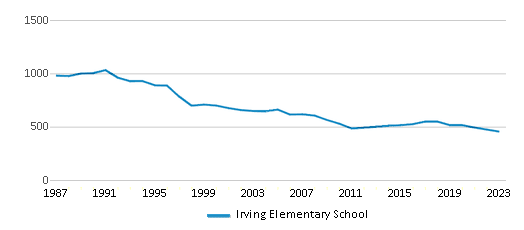
Gender %
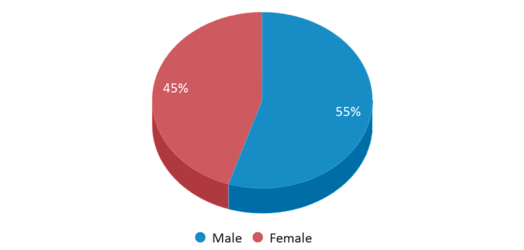
Total Classroom Teachers
34 teachers
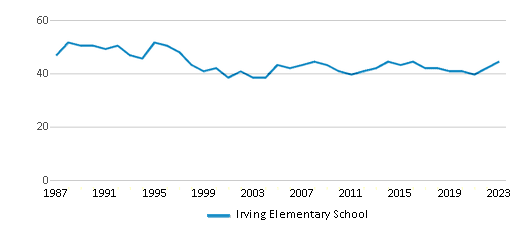
Students by Grade
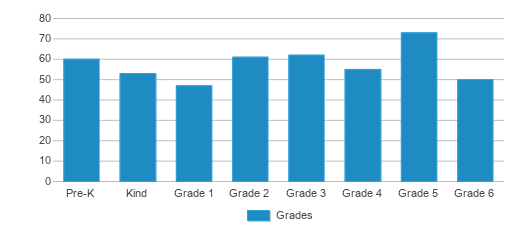
School Rankings
Irving Elementary School ranks within the bottom 50% of all 1,956 schools in Arizona (based off of combined math and reading proficiency testing data).
The diversity score of Irving Elementary School is 0.59, which is less than the diversity score at state average of 0.66. The school's diversity has stayed relatively flat over five school years.
Overall Testing Rank
#1191 out of 1956 schools
(Bottom 50%)
(Bottom 50%)
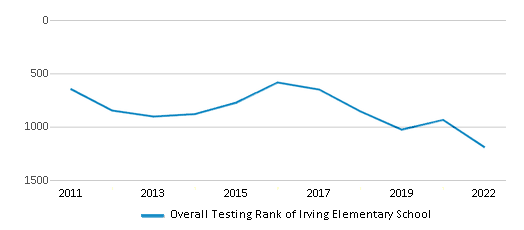
Math Test Scores (% Proficient)
22%
35%
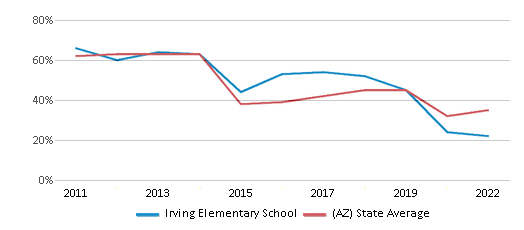
Reading/Language Arts Test Scores (% Proficient)
30%
40%
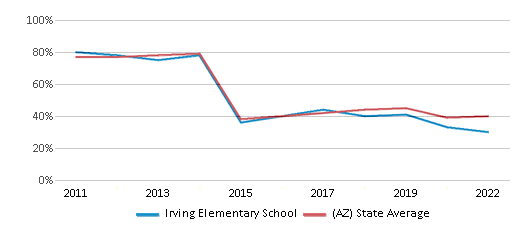
Science Test Scores (% Proficient)
11-19%
24%
Student : Teacher Ratio
14:1
17:1
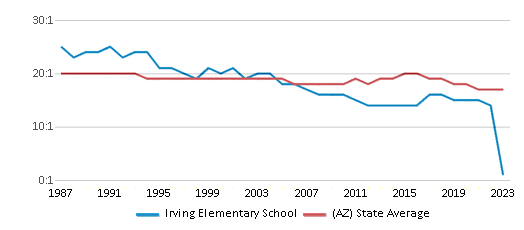
American Indian
1%
5%
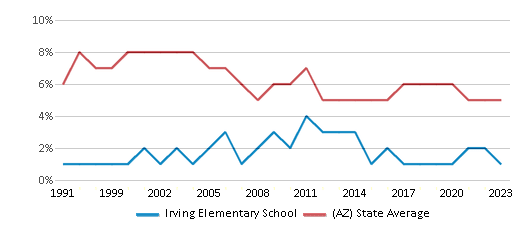
Asian
n/a
3%
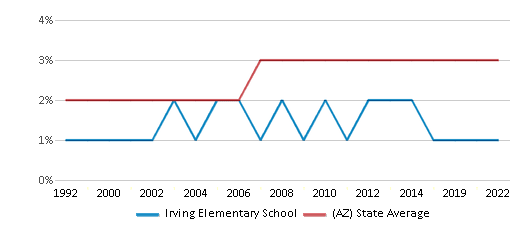
Hispanic
53%
48%
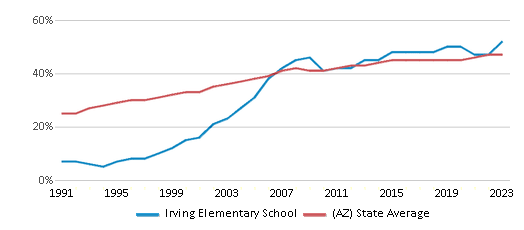
Black
3%
6%
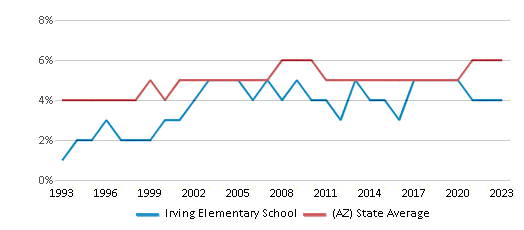
White
37%
34%
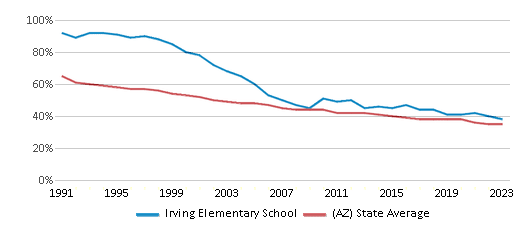
Hawaiian
2%
n/a
Two or more races
4%
4%
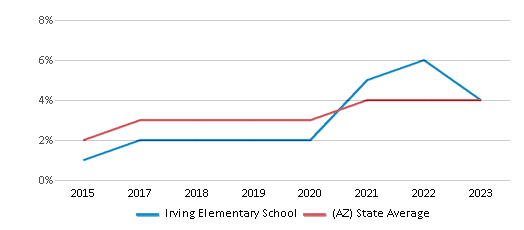
All Ethnic Groups
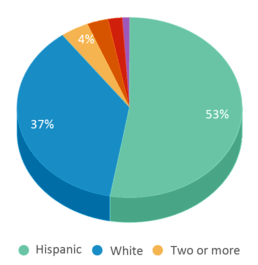
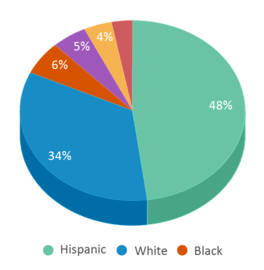
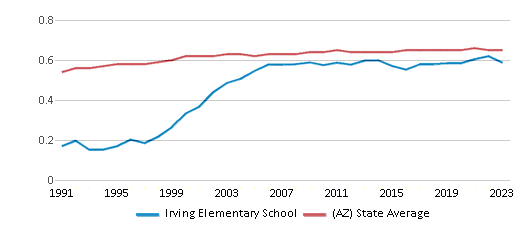
Eligible for Free Lunch
77%
40%
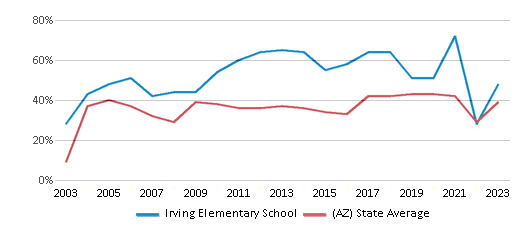
Eligible for Reduced Lunch
11%
10%
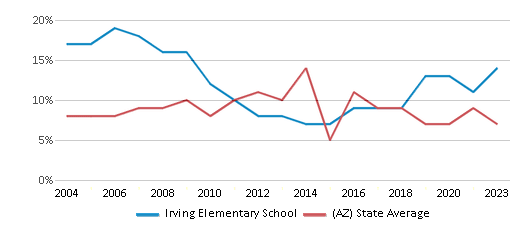
School Statewide Testing
School District Name
Source: National Center for Education Statistics (NCES), AZ Dept. of Education
Profile last updated: 02/09/2025
Frequently Asked Questions
What is Irving Elementary School's ranking?
Irving Elementary School is ranked #1191 out of 1,956 schools, which ranks it among the bottom 50% of public schools in Arizona.
What schools are Irving Elementary School often compared to?
Irving Elementary Schoolis often viewed alongside schools like Michael T. Hughes Elementary School, Canyon Rim Elementary School, American Leadership Academy Mesa K-6 by visitors of our site.
What percent of students have achieved state testing proficiency in math and reading?
22% of students have achieved math proficiency (compared to the 35% AZ state average), while 30% of students have achieved reading proficiency (compared to the 40% AZ state average).
How many students attend Irving Elementary School?
461 students attend Irving Elementary School.
What is the racial composition of the student body?
53% of Irving Elementary School students are Hispanic, 37% of students are White, 4% of students are Two or more races, 3% of students are Black, 2% of students are Hawaiian, and 1% of students are American Indian.
What is the student:teacher ratio of Irving Elementary School?
Irving Elementary School has a student ration of 14:1, which is lower than the Arizona state average of 17:1.
What grades does Irving Elementary School offer ?
Irving Elementary School offers enrollment in grades Prekindergarten-6
What school district is Irving Elementary School part of?
Irving Elementary School is part of Mesa Unified District (4235) School District.
School Reviews
4 2/25/2017
My daughter's teacher is awesome. He really cares how his students are doing. Great job Mr. Holmes!
3 12/28/2016
I'm upset about how they do the award assembly's. I've waited for my kids to reach school age so I can cheer them on and this school doesn't allow that. The first assembly we could only clap 3 times, which I've accepted. This assembly however, was very quiet and when the principal said "let's show them how proud we are", everyone is required to do some type of spirit fingers instead of clapping, saying good job, etc. My son came home and asked me why no one was proud of him. The fact that the principal wants this to be like military school and for the assembly's to be absolutely quiet is ridiculous.
Review Irving Elementary School. Reviews should be a few sentences in length. Please include any comments on:
- Quality of academic programs, teachers, and facilities
- Availability of music, art, sports and other extracurricular activities
Recent Articles

Sexual Harassment at Age 6: The Tale of a First Grade Suspension
A six-year old in Aurora, Colorado, was suspended after singing an LMFAO song to a little girl in his class and reportedly “shaking his booty.” We look at the case and the sexual harassment problem in public schools today.

How Scaffolding Could Change the Way Your Child Learns
This article explores the concept of instructional scaffolding, a teaching method that enhances learning by breaking down complex tasks into manageable parts. It highlights how scaffolding supports students in developing critical thinking skills and becoming more independent learners. The article discusses the benefits of scaffolding, including improved engagement and reduced anxiety, and provides strategies for its implementation across various educational levels.

February 05, 2025
Understanding the U.S. Department of Education: Structure, Impact, and EvolutionWe explore how the Department of Education shapes American education, from its cabinet-level leadership to its impact on millions of students, written for general audiences seeking clarity on this vital institution.





